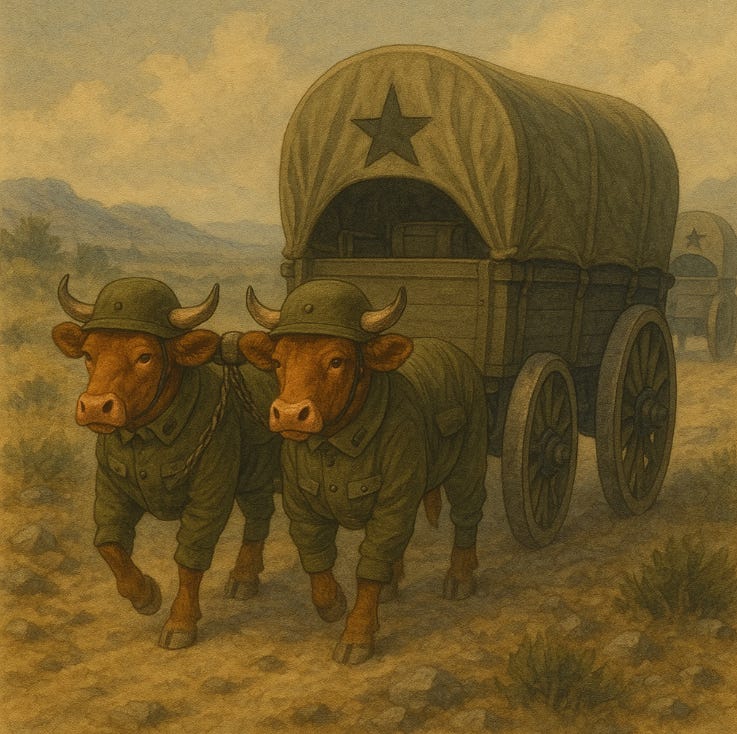Here’s a brief correction of Eliyahu Munk’s translation of Rashbam on the sidra of Naso. Consider the pasuk, Bemidbar 7:3:
וַיָּבִ֨יאוּ אֶת־קׇרְבָּנָ֜ם לִפְנֵ֣י יְהֹוָ֗ה שֵׁשׁ־עֶגְלֹ֥ת צָב֙ וּשְׁנֵ֣י עָשָׂ֣ר בָּקָ֔ר עֲגָלָ֛ה עַל־שְׁנֵ֥י הַנְּשִׂאִ֖ים וְשׁ֣וֹר לְאֶחָ֑ד וַיַּקְרִ֥יבוּ אוֹתָ֖ם לִפְנֵ֥י הַמִּשְׁכָּֽן׃
and brought their offering before יהוה: six draught carts and twelve oxen, a cart for every two chieftains and an ox for each one. When they had brought them before the Tabernacle,
The phrase is eglot tzav. What is a tzav? Rashi explains:
שש עגלת צב. אֵין צָב אֶלָּא מְחֻפִּים, וְכֵן "וּבַצַּבִּים וּבַפְּרָדִים" (ישעיה ס"ו); עֲגָלוֹת מְכֻסּוֹת קְרוּיוֹת צַבִּים:
שש עגלת צב SIX COVERED WAGONS — The word צב means “covered over”. Similar is, (Isaiah 66:20) “(And they shall bring all your brethren …] in covered wagons (בצבים) and upon mules”, where covered wagons are called צבים without the addition of a word denoting “wagons” (Sifrei Bamidbar 46 1).
So for Rashi, tzav means covered everywhere, based on usage of the word alone in Yeshaya. And so both here and there, it means that the nesi’im gifted covered wagons.
Rashbam is Rashi’s grandson, and his commentary is often a peshat-oriented reaction to Rashi. That’s why it is important to first see Rashi. Rashbam writes, with Eliyahu Munk’s translation, with which I’ll take some issue:
עֶגְלֹת - לפי שהוא דבוק. עֲגָלוֹת של צב כמו שיאמר מעשרה עשרות יאמר מן עגלה של ב' הנשיאים עגלות, ומן עֲנָוָה עַנְוֵי ארץ ומן עֲרָבָה עַרְבֵי נחל.
עגלות, seeing that the word is in a construct mode, i.e. עגלות צב, the vowel pattern is “eglot,” “draught carts”, instead of “agalot,” “carts.” We know similar vowel pattern changes in the word “essrot,” “tens of,” instead of simply assarot, tens. When the Torah writes that “one” cart was brought by a team of two princes it uses the standard vowel pattern agalah, as in that part of the verse the princes are the adjective (so to speak) and not the carts, as in the beginning of the verse.
צב - כמו ובצבים ובפרדים. פתרונו לפי עניינו. ונראה בעיני עגלות העשויות להלוך בצבא ובדרכים רחוקים.
צב, the word has different meanings in different contexts. In Isaiah 66,20 בצבים ובפרדים, “with mules and dromedaries,” it clearly refers to a category of animal. In our context it means animals that are used to be traveling with an army, צבא. The animals in question are able to travel long distances.
The point of Rashbam’s commentary on eglot is to explain that it is carts, thus wagons, not to be interpreted as calves, the plural of eigel / calf.
And yes, eglot tzav is a phrase. But “draught carts” that Eliyahu Munk injects is not in Rashbam’s explicit words. To explain, a “draught cart” is a cart pulled by an animal. Rashbam does not say this yet, or even at all.
The point of Rashbam’s commentary on tzav is to explain the very word, and not necessarily as “animal.” First, he cites the same verse in Yeshaya that his grandfather Rashi cited. That verse in Yeshaya could mean various things. To quote one translation of Yeshaya 66:20:
וְהֵבִ֣יאוּ אֶת־כׇּל־אֲחֵיכֶ֣ם מִכׇּל־הַגּוֹיִ֣ם ׀ מִנְחָ֣ה ׀ לַיהֹוָ֡ה בַּסּוּסִ֡ים וּ֠בָרֶ֠כֶב וּבַצַּבִּ֨ים וּבַפְּרָדִ֜ים וּבַכִּרְכָּר֗וֹת עַ֣ל הַ֥ר קׇדְשִׁ֛י יְרוּשָׁלַ֖͏ִם אָמַ֣ר יְהֹוָ֑ה כַּאֲשֶׁ֣ר יָבִ֩יאוּ֩ בְנֵ֨י יִשְׂרָאֵ֧ל אֶת־הַמִּנְחָ֛ה בִּכְלִ֥י טָה֖וֹר בֵּ֥ית יְהֹוָֽה׃
And out of all the nations, said GOD, they shall bring all your kindred on horses, in chariots and drays, on mules and dromedaries, to Jerusalem My holy mountain as an offering to GOD—just as the Israelites bring an offering in a pure vessel to the House of GOD.
A “dray” is an archaic word for cart. Note that the preceding phrase is basusim uvarechev, on horses and chariots. so, batzavim uvaperadim could mean on drays and their mules. And dromedaries stand alone.
Rashbam quoting the same phrase his grandfather does does not mean that he thinks that tzavim are animals.
Further, by פתרונו לפי עניינו, Rashbam is arguing against a universal meaning of tzav, so it seems strange to carry over the precise meaning we think (correctly or incorrectly) it means in Yeshaya. Munk seems to translate this phrase as “it clearly refers to a category of animal.” Because the inyan there he think unambiguously refers to an animal, so it must mean the same here.
Rashbam continues with ונראה בעיני עגלות העשויות להלוך בצבא ובדרכים רחוקים, which Eliyahu Munk translates as “ In our context it means animals that are used to be traveling with an army, צבא. The animals in question are able to travel long distances.” Entirely forgetting that eglot / agalot means wagons, he renders it as “animals”, like calves, which regularly travel with an army.
No! Rashbam is saying that he thinks that, rather than “covered”, the wagons are army-oriented, that is, the type of wagon that can travel in the army and over long distances.





A valuable understanding to think about.